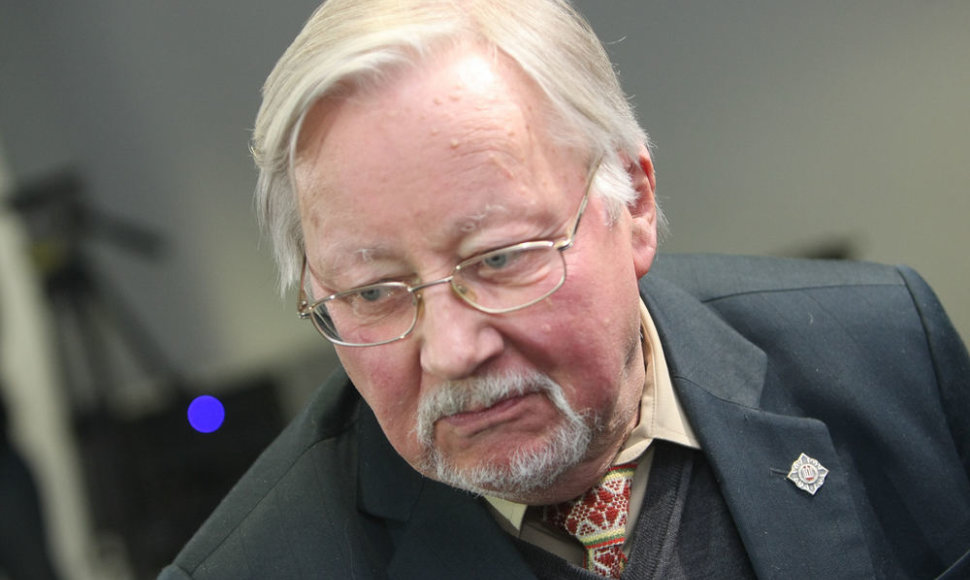The anniversary of Soviet deportations in the Baltic states were commemorated at the European Parliament in Strasbourg on Wednesday. Landsbergis, one of the organizers of the commemoration, told BNS that the annual event, held since 2006, is attracting more and more people.
"While doing political work here, I can see that it's a long work that needs patience and consistency, if we want people to know more about the fate and present of our countries," the former leader of the Reform Movement Sąjudis said.
But little strokes fell great oaks, Landsbergis noted. "And these are oaks of indifference, ignorance, people's minds are occupied with other things, and bringing that new knowledge and also compassion, and new understanding, it needs time," he said.
A memorial plaque has been hanging at the European Parliament's Visitors' Center since 2006, for the commemoration of the start of Soviet deportation on June 14, 1941. Lithuanian, Latvian, and Estonian MEPs as well as guests gather here every year on that day to commemorate the day when massive deportations of Lithuanian, Latvian, and Estonian residents to remote areas of the Soviet Union were launched.
Attending the commemoration, Latvian MEP Sandra Kalniete reminisced about her personal experience and talked about the importance of recognizing the first threats to European values.
"The past is always about the future because we need to study and understand past not to repeat the same mistakes in the future, to be more sensitive to the first signs which already announce that something is forming, something which could lead to a dangerous development that could threaten human beings and threaten our rights, can threaten democracy and ... European values," Kalniete told BNS.
Asked whether such commemorations of painful dates raise awareness at the European Parliament, Kalniete reminded of the fact that the Baltic states and the EU's other new eastern member states have done a lot to attract Europe's attention to crimes of totalitarian regimes.
"In 2009, the Parliament passed a resolution on European conscience and totalitarianism. Until this day, this is the highest-level political position taken by European states. This is a document that outlines what should be done to raise awareness, how to integrate it into the educational system, how to commemorate, to preserve the memory and how to research. I am personally most interested in that research part because with research, you make public new and new pages of that history and you provide material for reflection and understanding," the Latvian MEP said.
The joint Baltic event was hosted by Estonian MEP Tunne Kelam. Asked whether such commemorations of historic dates is the only remaining thing uniting the Baltic states, he said that we are mislead by "superficial" differences.
"During a certain period, our common past united us because we had common dangers, a common enemy. I think that nowadays we have much more in common than previously. We have never in our history been so close to each other. So let us not be mislead by superficial differences, there will be always differences between member states, sometimes huge differences, but the Baltic nations have managed to keep together and this commemoration of common past can unite us to today in a more positive ay," the Estonian MEP said.
Lithuanian MEP Algirdas Saudargas stressed that there has been a lot of pain in the European history, and that it's important for the Lithuanians to transmit heroism into the future. "The past should be commemorated in the future. Sometimes we perhaps focus on that pain we need to pay homage to, but we should not try to impress others with our pain. I think there are other things that need to be cherished, and that is the heroic part and the fact that we did not give up. That spirit that stopped the tanks is worth being brought into the future," Saudargas said, adding that this side of history is very close and understandable to young people.
Another important event for the Lithuanian history will be marked at the European Parliament in Brussels on Jun. 26 ahead of a meeting of the EU Council. On this day, the inauguration of "The Baltic Way" corridor at the European Parliament will take place. This inauguration will be held in the presence of Lithuanian President Dalia Grybauskaite, Latvian Prime Minister Valdis Dombrovskis, Vice-President of the European Commission Siim Kallas, and leaders of the Baltic Revolution.
One of the organizers, Lithuanian MEP Radvilė Morkūnaitė-Mikulėnienė, said a memorial plaque and an exhibition of historic photos of the Baltic Way will be unveiled during the ceremony.












